Thoughts On: The Band, STAGE FRIGHT
Published on July 16th, 2012 in: Music, Music Reviews, Retrovirus, Reviews |By Paul Casey
Part three in a continuing series on THE BAND’s discography.
To read the whole series, go here.
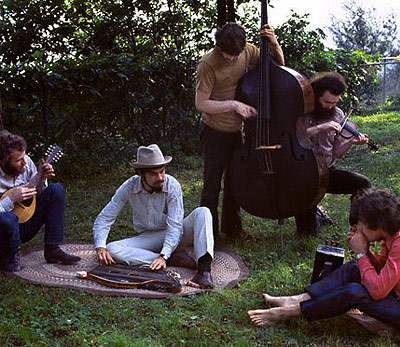
“Now deep in the heart of a lonely kid
Who suffered so much for what he did
Gave this plough boy his fortune and fame
And since that day he ain’t been the same.See the man with the stage fright
Just standing up there to give it all his might
And he got caught in the spotlight
But when it gets to the end
He wants to start all over again.”
—From “Stage Fright”
Stage Fright was released in 1970. It followed The Band. “Hey, that was a masterpiece! What is this non-masterpiece? Why is it a non-masterpiece? I’m confused. Is this the Newport Folk Festival?” Stage Fright is the most personal, and least enamored with the fictional history aesthetic, of all of THE BAND’s records. It also features more single vocal outings than the two previous albums.
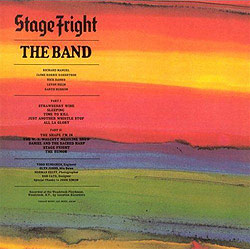
It is a confessional record. It is still quite far from the singer-songwriter mode of Joni Mitchell or James Taylor, but it is far less concerned with celebrating/fetishizing all things old timey, and more so with getting to the heart of the matter. It is a sad album, full of the experiences of growing individuation and isolation. It is the last time that Richard Manuel is credited for writing a song. It is the start of a period where people get more enjoyment from discussing the decline, than hearing the music. And the music is sublime.
What is clear from the events around Stage Fright is that almost everyone in THE BAND was avoiding work, having more fun with the new found excesses of fame. In spite of the two songs co-credited to Manuel, and one to Levon Helm, the bulk of the work fell on Robbie Robertson, as it would on every album and project to follow. As a personal expression of THE BAND’s state, these ten songs may be Robbie Robertson’s most heartfelt work, and are in some important ways above the two previous records.
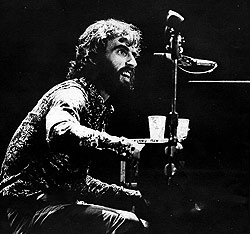
Richard Manuel
Photo © Ernst Haas, 1971
The title track in particular is of a different stock than anything on Big Pink or the self-titled album. First, it speaks of and to the time period in which it was recorded. It is also the first time that THE BAND addressed themselves and their own profession. “Stage Fright” is the situation in which they found themselves. For Richard Manuel, in particular, the lyrics resonate with the conflicting joys and miseries to be found on the road. It might bury you in the end, but right now it’s all there is to live for. Rick Danko gives it his all. Like the Chester verse in “The Weight,” Danko needs to be seen singing this song.
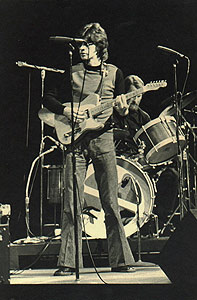
Robbie Robertson
“I never liked the approach of, ‘Well let me write a little song about what’s happening to me today.’ I was never big on that. I was always like, ‘Let me tell you a story and in telling this story, I’m gonna reveal some things but you’ll never know what I’m revealing, and what exactly is the revealing part of it.’ I always felt that was when I was most comfortable with, rather than, ‘I woke up this morning, had a cup of coffee, my life is so fascinating I feel I have to express it to you.’ That embarrassed me!
“But, in Stage Fright all of a sudden this stuff is starting to creep out and I don’t even want to let it out! I’m trying to hold it in and I couldn’t. In the course of all of these things there were being written, whether it’s ‘The Shape I’m In’ or ‘All LA Glory’ or whether I’m talking about ‘The W.S. Walcott Medicine Show,’ I was really talking about the same kind of spectacle that we had become. Everything was reflective to me. Can manifest themselves in extraordinary musical ways. Something comes into your life that’s unfamiliar and it surprises you and you react in a way that surprises you. When this is translated into music, sometimes it can be your best work.
“Other musicians have conveyed to me something that wasn’t clear enough at the time. There is something more dangerous, there is something more helpless, there is something more vulnerable in this record than any other record. To have the nerve to write ‘The Shape I’m In,’ to have the nerve to write ‘Stage Fright,’ to have the frame of mind to write a song about selling your soul for music, to write ‘Daniel and the Sacred Harp,’ to talk about this reflection of yourself in the medicine show and that you think that this is really the origins of this music, that this is really where you’re coming from, this combination of carnival and musicality, for me to overcome with this incredible new joy and experience in my life, to be able to talk about for the first time something as personal as having my first child and then to look around and see people nodding out in the midst of writing a song with Richard called ‘Sleeping’ is incredibly confessional. I’m sorry!”
—Robbie Robertson, quoted from Rob Bowman’s liner notes
“Sleeping” has the ethereal quality of “Whispering Pines,” and as Robbie suggests above, is an expression of where Richard was at the time of writing. It is a desperately sad song, and is effectively Manuel’s goodbye to THE BAND as a creative force, and Robbie’s goodbye to his friend. Like other definitive, troubled souls, it is hard to separate Richard’s bad end from the songs he worked on. “Sleeping” is perhaps the hardest, as it was the end of the line, and addresses the oncoming void openly.
“The storm is passed
There is peace at last
I’ll spend my whole life sleeping
Now there is not a sound
No-one to be found anywhere.”
“Just Another Whistle Stop,” the second song credited to Manuel and Robertson, is an upbeat stomper. Like most of the album, it can be seen as a direct call to THE BAND. Keep it together, and keep working. The bother of the tour was something all had contended with for years prior to finding their success, and now that dues were being given to a group that were previously hidden behind folks like Ronnie Hawkins and Bob Dylan, it was falling apart. “Just Another Whistle Stop” is the tragic humor to be found in it.
“It’s just another whistle stop
If you don’t quit til we reach the top
I’d be much obliged to you
It’s odd man out
You know that’s a rule
You can scream and you can shout
But they’ll only call you a crazy fool
Pay no mind to what you read
There’s one way home that’s guaranteed.”
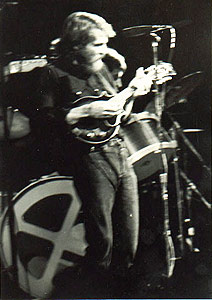
Levon Helm
Photo © Bruce Smith, 1971
Levon also turns up on a co-writing job. The opener, “Strawberry Wine,” is a slight, but severely rocking jaw. Has something of “Cripple Creek” about it. Removed, outta it, drunk time music. Due in part to its placement beside “Sleeping,” it expresses a good time that is not exactly healthy or clean. This is the mood of Stage Fright. High times disguise the big fall. Oh, it’s coming though.
“Time To Kill” has this too, even while recalling the group vocal sound of “We Can Talk” and that song’s happy disposition. THE BAND were killing far too much time. Drugs had become a thing, especially heroin. A disinterest in their collective future was growing, with Robertson having to shoulder much of the responsibility for keeping THE BAND together and moving forward. It would result in The Last Waltz, and for the severe falling out between Helm and Robertson.
Stage Fright contains many secrets. The most surprising is that it contains Levon Helm’s very best vocal performance. “All LA Glory” is the song Robbie wrote for his child. Levon sings soft and sweet, Garth works a dreamy accordion, and Robbie’s confessional approach produces an elegant, expressive set of lyrics. Levon’s versatility as a singer matched his talent on percussion. He could do out of control better than anyone, bringing the vicious, raw edge of Iggy Pop to the country. On “LA Glory” he shows that he could also emote like a bastard.
“Listen to the serenade
Little girl promenade
Now you got the sunshine in your hand
And maybe come sweet day
You’ll walk that Milky Way
In all LA Glory
I’m second story
Feel so tall
Like a prison wall
That’s all.”
“The W.S. Walcott Medicine Show” is another example of Levon’s life informing the material of Robbie Robertson. Like “Dixie,” the idea of the medicine show originated with memories from Levon, of going to see such shows as a younger fellow. It is closest to the material on The Band in spirit and the kind of America it depicts. “Daniel and the Sacred Harp,” even while commenting on the sorry deal with the Devil that THE BAND made to attain fame, follows in this tradition. It is a storyteller song, the kind that Robbie was most comfortable with. Richard Manuel plays Daniel, the guy who sells his soul for the chance to attain the mystical instrument. Levon tells the story. Helm’s reading on the final verse is a flavor that only he could bring.
“Then Daniel took the harp
And went high on the hill
And he blew across the meadow
Like a whippoorwhill
He played out his heart
Just the time to pass
But as he looked to the ground
He noticed no shadow did he cast.”
“The Shape I’m In” is the partner to “Stage Fright.” It’s a rocker, and has some humor to it, but it’s a down and out song. Manuel delivers the lead vocal, with Danko and Helm backing him up on the chorus. Garth Hudson lays in some organ over Robbie’s spiky guitar. The version recorded for The Last Waltz gives visual evidence. Manuel’s beard, thin face, and ravaged voice show a life lived to this song. The below also becomes reality.
“Save your neck
Or save your brother
Looks like it’s one or the other
Oh you don’t know the shape I’m in.”
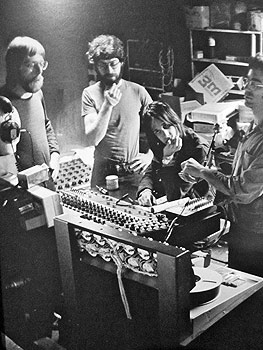
With Todd Rundgren in the studio
“The Rumor” features Danko, Helm, and Manuel backing each other, and trading off on lines. Aurally it is the closest to anything on the previous albums. It is a terribly paranoid song to finish with, but is in keeping with where these men were going as friends and collaborators. No longer could everything be tackled as a group. Bother over ego and the long hangover provided by success would soon alter their studio work in a negative way. Stage Fright is not the result of that, though. It is a commentary on the problems that were beginning to become apparent, but it is not compromised. It is a wonderful record, and evidence of a group still working at the top of their form.
“Now all you vigilantes
Wanna make a move
Maybe they won’t
You know I sure hope they don’t
For whether this rumor proves true or false
You can forgive
Or you can regret
But he will never ever forgetClose your eyes
Hang down your head
Til the fog blows away
Let it roll away
Open up your arms
And feel the good
It’s a coming
A brand new day.”
Time limit is exhausted. Please reload the CAPTCHA.